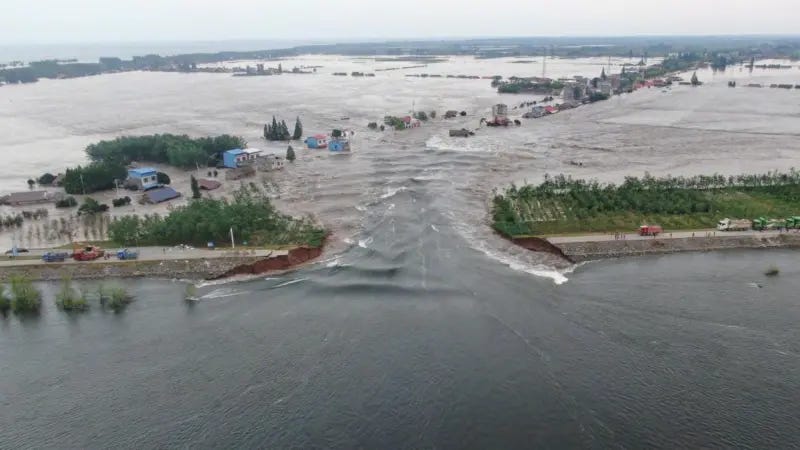Welcome to RealTime Mandarin—a multimedia resource to immerse you in the latest Chinese language trends, inspire you to practice and improve your Mandarin every week, and empower you to communicate with confidence.
Subscribe now to get the next issue straight to your inbox!
Since the beginning of 2024, southern China has experienced heavy rains and flooding on a scale not seen in decades.
In April, the Pearl River basin in Guangdong experienced the earliest flood of a major river in China since 1998.
The flooding has caused deadly incidents such as the collapse of earthworks on the Meizhou Expressway in Guangdong on May 1, resulting in at least 48 deaths.
In mid-June, heavy summer rainfall, also known as “plum rain” (梅雨) because it coincides with the plum season, brought a new wave of disasters.
The provinces of Guangdong, Guangxi, Fujian, and Hunan were all badly hit by floods.
In Guangdong, Meizhou was again the most severely affected area in the province. On June 16, the city experienced a 24-hour precipitation of 369.3 millimetres, which was "unprecedented" according to residents.
In the central province of Hunan, the Miluo River (汨罗江 mìluō jiāng) swelled to its highest level in 70 years.
Back in the south, Guilin in Guangxi province experienced continuous heavy rainfall, causing the water level of the Li River (漓江 líjiāng) to rise above its warning level by nearly 3 metres, and surpass the level which led to the catastrophic floods of 1998.
In Wuhan, the capital of the central province of Hubei, the water level at the Hankou station, which monitors the middle reaches of the Yangtze River, rose by 5 metres, surpassing 25 metres for the first time in three years, causing flooding in some urban areas.
Rising levels of the Yangtze River upstream following intense rains have prompted eastern regions downstream to prepare for possible flooding.
The seemingly endless rains have residents in the heaviest hit regions asking: "will the rains ever stop?"
They use a creative pun on a common idiom:
The "endless plum rains" are so hard to cope with. When will the summer rains stop?
“梅完梅了”太难熬,梅雨时节何时了?[3]
“Plum” (梅) of “plum rain” (梅雨) sounds the same as “never” or “no” (没).
One of the worst hit areas of flooding caused by the summer “plum rains” is Dongting Lake (洞庭湖) in northeastern Hunan.
Dongting Lake is important for a number of reasons:
It’s one of China's five largest freshwater lakes.
It’s a key flood basin of the Yangtze River. During the rainy season, its area can increase from 2800 sq km to over 20,000 sq km.
The provinces of Hubei and Hunan are named after their location relative to the lake: Hubei (湖北) means "North of the Lake" and Hunan (湖南) "South of the Lake".
And, one more nerdy China fact for you, Dongting Lake is also the origin of dragon boat racing!
Back to the recent flooding, on July 5, an embankment of the lake breached in Huarong County, flooding Yueyang (岳阳市), a city with a population of 5 million people. 200 million cubic metres of floodwater poured through a breach 226m in the embankment, inundating an area of over 47 square kilometres in the county of Tuanzhouyuan (团洲垸).
Note: "Yuan" (垸 yuàn), which can be translated as "dike" or "embankment" in English, is a common place name around Dongting Lake. Since the time of the Ming Dynasty, many towns in the area were expanded by reclaiming land, with large-scale reclamation happening since 1949. To prevent flooding, locals built embankments, and the area within those embankments are "yuan".
This is not the first time the time of Tuanzhouyuan has flooded. In 1996, the same embankment of Tuanzhouyuan was torn open by huge floods, creating a breach over 460 metres wide, decimating the town below.
Some residents who lost everything then, have lost everything again in floods this year.
Like 60-year-old Lǐ Shùwén 李树文, interviewed by the magazine, Life Week.
In 1996, the flood in Tuanzhouyuan destroyed Li Shuwen's house. At that time, he was in his 30s. After losing everything, he worked on construction sites for four years to save money to build a new house.
But now at the age of 60, he has lost everything again.
"Everything that I worked for over so many years is gone in an instant. When it happened last time, I was young and could still work. Now I'm just a farmer and am 60 years old. I'm too old to be hired as a migrant worker. There is nothing I can do."
“都是这么多年积累下来的东西,一下全没了。以前被水淹了,我年轻还可以再干,现在我就只是个农村种田的人,也60岁了,去外面打工都没人要,我哪里还有那个能力呢?” [2]
So, that's what we're exploring this week!
Favourite Five
1. 梅雨 méi yǔ
rainy season in East Asia, plum rain
那年梅雨季,钱塘江流域遭遇史上最强梅汛 - The Qiantang River basin experienced the heaviest precipitation in history during the summer rainy season that year. [1]
Related:
梅汛 méi xùn - rainy season floods
出梅 chū méi - end of the rainy season (入梅 - entering the rainy season)
霉雨 méi yǔ - mouldy rain (very wet and humid conditions of the summer rainy season often cause mould)
梅雨带 méi yǔ dài - rain belt of the East Asian rainy season
梅雨季节 méiyǔ jìjié - rainy season
2. 洪水 hóng shuǐ
flood
发生点内涝还有可能,市区发大洪水不可能的 - It's possible to have urban waterlogging, but a major flood in the city centre is unlikely. [1]
Related:
水势 shuǐ shì - water potential
泄洪 xiè hóng - flood discharge
淹没 yān mò - inundate
3. 决堤 jué dī
dam breach
紧急封堵失败后堤坝决堤,决堤口宽度为226米 - As emergency sealing failed, the dam breached, with a breach width of 226 metres. [2]
Related:
溃坝 kuì bà - dam collapse
管涌 guǎn yǒng - piping effect (erosion of dams)
翻沙鼓水 fān shā gǔ shuǐ - piping (a colloquial way to say “piping effect”, and easier way to understand it: “flip sand, drum water”)
4. 南涝北旱 nán lào běi hàn
southern floods and northern droughts
作为厄尔尼诺刚刚退出的年份,今年南涝北旱,降水的不均匀异常突出 - As El Niño events are just over, this year sees floods in the south and droughts in the north, with exceptionally uneven precipitation. [1]
Note: The age-old challenge of governing China’s infrastructure since ancient times.
5. 梅完梅了 méi wán méi liǎo
the never-ending summer rains
“梅”完“梅”了太难熬,梅雨时节何时了? - The endless rains are so hard to cope with. When will the summer rains stop? [3]
Related:
黄梅天 huáng méi tiān - the plum rain season (same meaning as 梅雨季节)
Consuming the Conversation
Useful words
6. 内涝 nèi lào
urban waterlogging
城区部分地区出现内涝 - There is urban waterlogging in certain areas. [1]
7. 闸口 zhá kǒu
sluice gate
当清亮的千岛湖水从闸口喷涌而出,起初大家还开玩笑每一秒钟放走了几十万瓶的农夫山泉 - As the clear waters of Qiandao Lake gushed out from the sluice gate, initially everyone joked that this is equivalent to releasing hundreds of thousands of bottles of Nongfu Spring every second. [1]
8. 江堤 jiāng dī
river embankment
杭州的江堤都是按照风暴潮洪水合一设计的,海塘的标准 - The river embankments in Hangzhou are designed to withstand storm surges and floods, meeting the standards of seawalls. [1]
Related:
海塘 hǎi táng - seawall
9. 征兆 zhēng zhào
omen, sign
长江全流域还没有洪水的征兆 - There are still no signs of flooding across the entire Yangtze River basin. [1]
10. 合龙 hé lóng
closure, close the dam breach
决堤处开始封堵合龙,截至7月7日17时,决口封堵已完成91.5米 - Work has started at the dam to seal and close the breach. As of July 7 at 5 pm, it had been completed for 91.5 metres. [2]
11. 险情 xiǎn qíng
critical situation, crisis
在7月5日下午三点半左右知道团洲垸的一线堤防出现险情 - Around half past three on the afternoon of July 5, the frontline dike at Tuanzhouyuan Embankment was found to be in a critical situation. [2]
12. 防汛 fáng xùn
flood defence
当时坝上防汛的村民过来喊他,说坝上出现了险情 - At that time, villagers responsible for flood defence came over to warn him that the dam was about to breach. [2]
Note: 汛 xùn means flood
Related:
堤防 dī fáng - dike, embankment
Three-character phrases
13. 一线天 yí xiàn tiān
narrow gap
桥面和水面之间只有一线天了 - There's only a narrow gap between the bridge deck and the water surface. [1]
14. 回马枪 huí mǎ qiāng
sudden turn of events, sudden change















